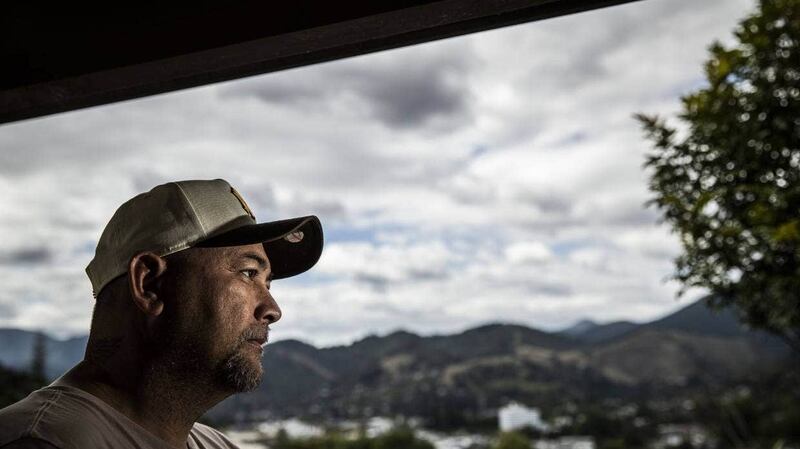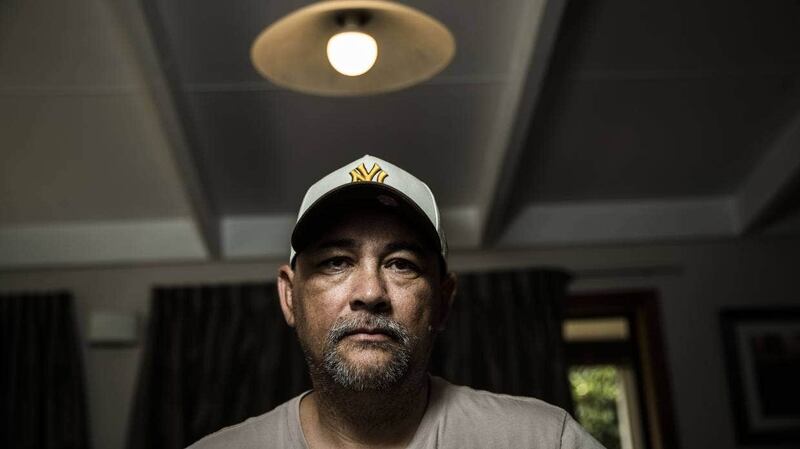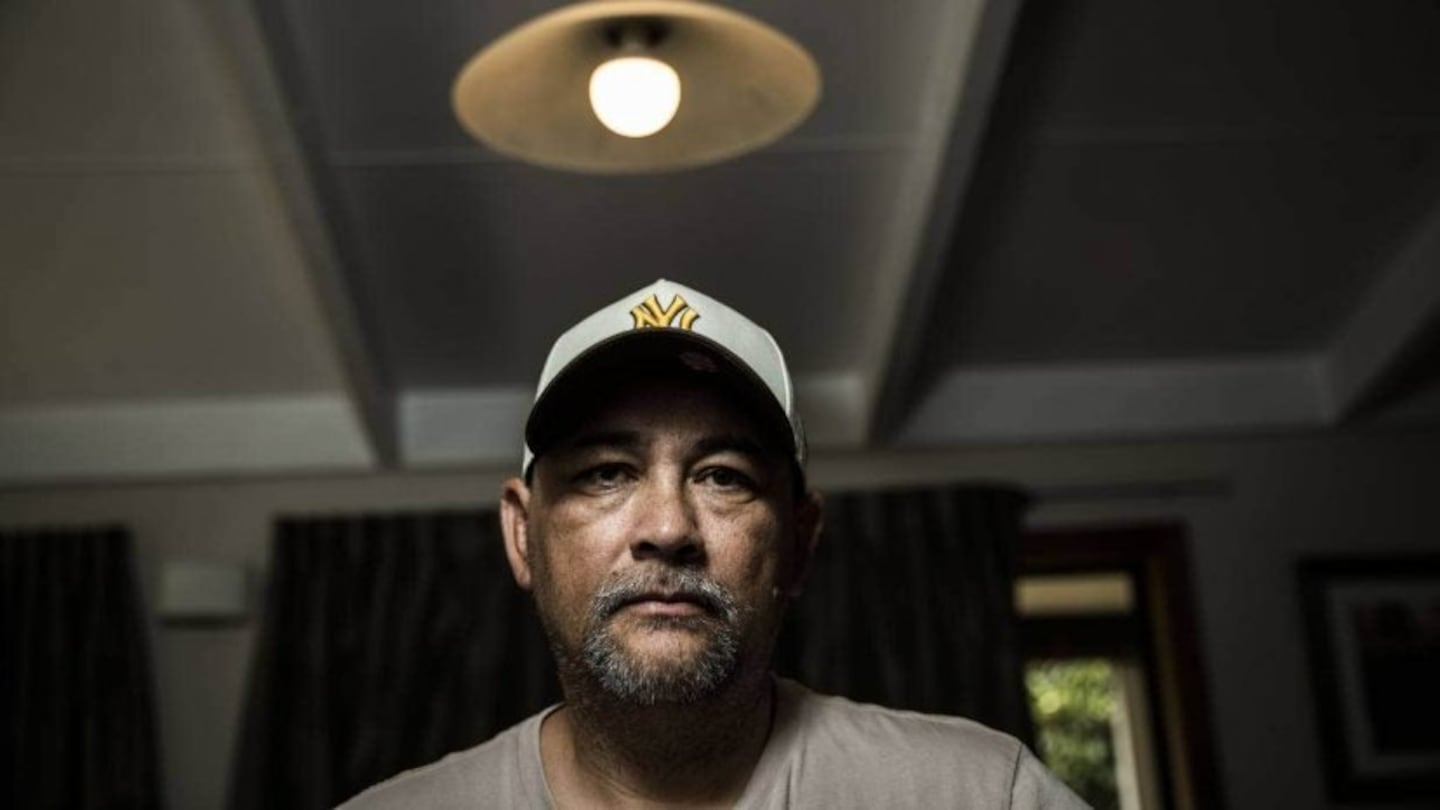At 47, Kyle Tahana has terminal cancer. He wants acknowledgement that his outcome was made worse because his doctor didn’t diagnose prostate cancer as early as they could have, and for ACC to pay compensation. Photo: Braden Fastier / Nelson Mail
By Katie Townshend, Stuff
Kyle Tahana knows no-one could stop him getting cancer – but he wishes he'd had more of a chance to fight it.
“By the time I was diagnosed, there was no chance of survival. So that there at 47 is just devastating, really,” the Nelson man says.
Now, a year after being given up to three years to live, Tahana wants acknowledgement that his outcome was made worse because his doctor didn’t diagnose the cancer as early as they could have, and for ACC to pay compensation.
But, ACC won't pay, because it says there was no failure, and even if there was it wouldn't have made a difference to his outcome.
That's despite an expert report prepared for ACC stating that Tahana should have been given a PSA test in 2020 – and a letter to Tahana's GP stating that he had "longstanding" urinary issues.
To Tahana, ACC’s decision is baffling.
“My doctor just blatantly, really, really did let me down and miss this, and it's cost me my life at an early age.”
The path to diagnosis
Sitting in his daughter’s home, where he lives in the flat downstairs so she can be his carer, Tahana explains that by the time he was diagnosed in late 2021 the cancer had metastasised to his bones, and was stage four. He was given three to 36 months to live.
Tahana said his doctor claimed that he never reported any urinary symptoms that would point to prostate cancer.

Kyle Tahana was diagnosed with terminal prostate cancer at the age of 47. Now, he is fighting ACC for compensation. Braden Fastier / Nelson Mail
But Tahana said he’d been reporting urinary symptoms for years.
“I was there many times, complaining about being up four or five times a night to go to the toilet. He even sent me to a sleep clinic because he thought I had sleep apnoea.”
He said 2021 “was full of a whole lot of back pains and problems with my legs and sleeping and, going to the toilet”, he said.
Getting up to use the toilet multiple times a night is a common symptom of prostate cancer.
Tahana had put the back and hip pain down to his long hours operating heavy machinery at Port Nelson. But then, in July 2021, he saw a different GP.
“She straightaway picked up that there's something seriously wrong.”
That GP ordered a PSA test – the blood test used to screen for prostate cancer – which came back at 50. Ministry of Health guidelines state that, for men under the age of 70, anything higher than 4 is abnormal, while a level higher than 20 meant “prostate cancer is highly likely to be present and metastases can sometimes be seen on bone”.
A repeat test came back at 48, and he was referred to the urology department at Nelson Hospital. Four months and 11 days later he was diagnosed with stage four cancer that had metastasised to his bones. His femur was so weak there was talk of inserting a rod to stabilise it.
“It was that aggressive I could pretty much feel it eating my spine at that stage.”
Since then, Tahana has had hormone treatment, radiation and chemotherapy.
The cancer had slowed, but his outlook remained the same, he said.
Along with the battle to get on his feet, there’s been the struggle to make ends meet, as he was unable to work so got by on the benefit.
“Dropping down to 30% of your income is devastating.”
He’d pinned his hopes to ACC cover. After all, he reasoned, he’d been going to the doctor for a long time with symptoms, but his GP never ordered a PSA test, giving him less time to fight the disease.
“It wasn't until it was almost taking my life that it was picked up.”

Kyle Tahana says he should have been offered a PSA test long before his 2021 diagnosis. Braden Fastier / Nelson Mail
A failure to diagnose?
In assessing the claim, ACC looked at two aspects: whether there was a failure in Tahana’s treatment, and whether his outcome was worse as a result.
A GP’s expert advice to ACC was that there was an opportunity to have caught his disease in October 2020 – more than a year before his eventual diagnosis.
Tahana had recorded a high C-reactive Protein blood test result (CRP), which tests for inflammation in the body, but an ultrasound didn’t find a cause for it.
The expert advised the GP should have done more tests to find a reason for the elevated result – which could have included a PSA test – but didn’t.
“Why test for CRP if you are not going to act on an elevated result,” they wrote.
“Given the extent of Mr Tahana’s disease, his PSA is likely to have been elevated as early as 2020 and even 2019, had it been checked.”
In response, Tahana’s GP said they did not believe a PSA was necessary as he was under the age of 50 and “I was not aware of any urinary symptoms”.
ACC found that there was no failure to diagnose because “there is no evidence to support that it was a departure from standards to then perform a PSA test as you had no prostate or urinary symptoms”.
But Tahana is adamant he had urinary symptoms – and he can prove it.
While there is no mention of urinary symptoms in his GP’s medical notes before 2021, it does record the receipt of a letter from the endocrinology department at Nelson Hospital in July 2019.
That letter states that Tahana, who had been seen on a different matter, “passes urine twice overnight which is a longstanding issue”, and that his grandfather had prostate cancer.
ACC deputy chief executive for service delivery Amanda Malu said she was “very sorry to hear of Mr Tahana’s diagnosis and understand this must be a difficult time for him”, but there was no evidence to support a failure to diagnose.
“The External Clinical Advice we sought advised that Mr Tahana’s mildly elevated C-Reactive Protein (CRP) rating may have been caused by the infection or injury, or an underlying health issue.
“As such, there was therefore no evidence to suggest the GP’s treatment clearly departed from accepted clinical standards to provide a basis for treatment injury cover.”
ACC “had not been provided with any endocrinological advice in relation to Mr Tahana’s claim”, she said.
“We can always reconsider a claim decision based on new medical information.”
A worse outcome?
Malu goes on to note that “for ACC to accept a treatment injury claim, there must be a clear causal link between the treatment and the injury”.
“We accept that there was a delay of a few weeks between Mr Tahana’s referral to a urologist and him being seen. However, based on the information we received, we were unable to find that this delay contributed to progression of the cancer.”
That is backed up by the reports to ACC, but, an expert oncologist opinion provided to ACC also makes it clear there is a chance he could have had a better outcome had it been diagnosed in 2019 or 2020.
“It is conceivable that if this gentleman was diagnosed earlier, say in 2019-2020, that he may have avoided a diagnosis of Stage T4N1M1 disease; but conversely, the same high Gleason grade may have predisposed to the development of early metastatic disease as well.”
Tahana believes having an extra year or two to fight his cancer would have made a difference.
“Even if I was stage four in 2019, I would have been [metastasised] after that, which means I've still been injured after that date, regardless, because it's spread from my prostate into my bones.”
Moving forward
Talking through his case, Tahana was sombre, but also quick to laugh when he could. It’s that, he said, or cry.
He plans to keep fighting ACC and is looking for a lawyer to take on the case, and he has a complaint in with the Health and Disability Commissioner about his GP.
Compensation through ACC would be “life changing for the time I have left”, he said.
Friends and family are Tahana's main support now – he's grateful he'll be around to see the birth of his second grandchild – and they're raising money through fundraisers and a Give a Little page to help support him.
Tahana is quick to acknowledge he’s had a “colourful” past – in 2012 he admitted 156 fraud charges, having stolen $90,000 from Nelson phone directory MyPages due to a gambling problem.
“I want to please acknowledge my past history in the region, even though this was over 10 years ago I fully believe I have paid the price for my wrong doings and at times still pay the price.
“But this is the past and I wish to extend an apology to anyone my misdemeanours may have affected.”
Now, he hopes to get an acknowledgement from his GP and ACC about his case, but he also hopes others might take it as a cautionary tale, and push to get symptoms investigated, especially those who are under 50.
“If you've got some problems ... like you're getting up three, four times a night, that's not normal, guys, it's not normal to do that. Get it checked out ... and if it still continues after you've had it checked out, go get a second opinion.
“If things aren't getting fixed, there’s something not right.”


